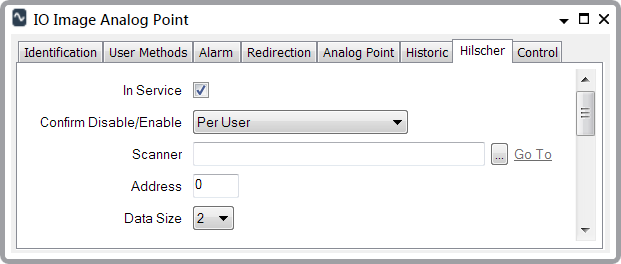Use the fields at the top of the Hilscher tab to configure the general point properties. Some of these fields are common to points on many simple drivers (see Configure Common Point Properties in the ClearSCADA Guide to Simple Drivers). Fields that are specific to points on the Hilscher driver are explained below.

- Scanner—Use to specify the Scanner that scans the point’s data. Select the browse button to display a Reference browse window. For a Hilscher IO Image Analog point, select the appropriate Hilscher IO Image Scanner; for a Hilscher Profibus FMS Analog point, select the appropriate Hilscher Profibus FMS Scanner.
- Address—Use to specify the address of the point on the Hilscher card. This is the address of the point within the Hilscher card’s memory.
With a Hilscher IO Image Scanner, ClearSCADA scans the whole card, and extracts the data from the relevant address(es) on that card.
With a Hilscher Profibus FMS Scanner, ClearSCADA scans a specified number of elements within a data array on a device (see Configure the Properties of a Profibus FMS Scanner). The point Address is an offset from the Scanner’s Data Start index. The Address and Data Size combination that you specify on the Point Form needs to be within the range that the Scanner is configured to scan.
- Data Size—Use the combo box to specify the size of the raw value, in bytes. Choose 1, 2 or 4 bytes, as appropriate.
Example:
On a particular ClearSCADA system, a Hilscher Profibus FMS Scanner is given this configuration:
Object Data Type:INT16 (16-bit integer)
Data Start:3
Data Length:;12 (bytes)
So the Scanner scans elements 3 to 14 on the FMS device (that is associated with the Scanner).
An Analog Point that uses the above Scanner is given this configuration:
Address::4
Data Size:2
To obtain the value of this point, ClearSCADA extracts the data for elements 6 and 7 from the scanned FMS device.